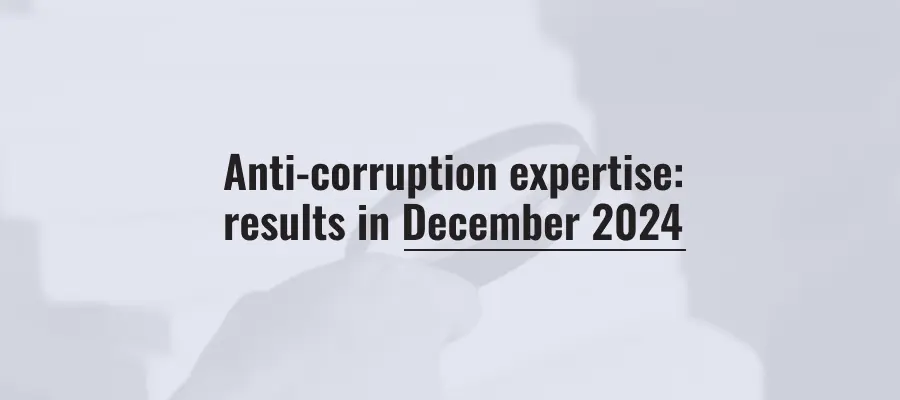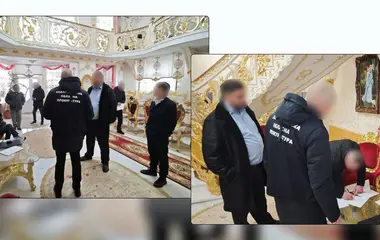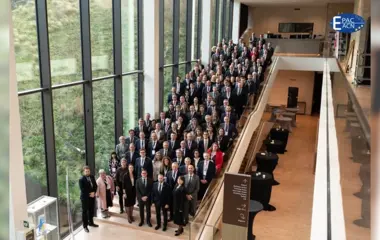In December 2024, the National Agency on Corruption Prevention (NACP) monitored 380 draft regulatory legal acts (RLAs): 290 draft acts of the Cabinet of Ministers of Ukraine (CMU) and 90 draft laws. Anti-corruption expertise was conducted for 17 draft regulations. Based on the results of the anti-corruption expertise, 37 corruption-prone factors were identified in the draft regulations and 45 recommendations were made to eliminate them.
For example, in the draft Law of Ukraine “On Amendments to Article 2 of the Law of Ukraine ‘On Lease of State and Communal Property’ regarding the provision of paid services in the field of physical culture and sports by state and municipal institutions that are not leased” (registration No. 12284 of 04.12.2024), NACP identified provisions that create conditions for corruption. It concerns the exemption from the Law of Ukraine “On Lease of State and Communal Property” of legal relations arising from the provision by a state or municipal institution of state-owned and communal sports facilities included in the Electronic Register of Sports Facilities related to the provision of paid services in the field of physical culture and sports that are not leased.
NACP submitted recommendations to the Verkhovna Rada Committee on Economic Development and the Verkhovna Rada Committee on Anti-Corruption Policy for consideration to eliminate the above corruption risks.
In addition, an anti-corruption assessment of the draft resolution of the Cabinet of Ministers of Ukraine “On Approval of the Procedure for the Transfer of State or Municipal Property that is Religious Property to a Religious Organization for Free Use (Loan)” was conducted, and a number of corruption-prone factors were identified, including
- the establishment of an unclear legal mechanism for keeping records of state or municipal property that is religious property, which facilitates the exercise of discretionary powers of officials of the authorized management body in a non-transparent manner
- lack of a complete and transparent decision-making procedure for transferring religious property belonging to the state or municipal property for use (loan), which creates conditions for corruption.
NACP provided the State Service of Ukraine for Ethnic Policy and Freedom of Conscience, which is the developer of the draft act, with recommendations that ensure the establishment of a transparent procedure for transferring state or municipal property that is religious property to a religious organization for free use (loan).
Based on the results of the anti-corruption expertise of the draft resolution of the Cabinet of Ministers of Ukraine “On Approval of the Procedure for Appointment and Payment of a One-time Financial Allowance in Case of Death or Disability of Private and Senior Officers of the State Criminal Executive Service of Ukraine”, the NACP experts identified a corruption factor that may lead to the risk of abuse by officials of the personnel service (personnel unit) of the body (institution) of the State Criminal Executive Service of Ukraine, a prisoner of war camp.
The National Agency provided the Ministry of Justice of Ukraine, which is the developer of the draft act, with recommendations, the consideration of which ensures the establishment of a transparent mechanism for the appointment and payment of one-time financial assistance in the event of the death of rank-and-file and senior officers of the State Criminal Executive Service of Ukraine.
In the draft Law of Ukraine “On Amendments to the Law of Ukraine ‘On Charitable Activities and Charitable Organizations’ regarding charitable activities of the defense industry enterprises”, the NACP identified provisions that create conditions for corruption: granting business entities (enterprises of the Ukrainian Defense Industry Joint Stock Company group) excessive discretionary powers when deciding on the provision of charitable assistance, given the lack of a procedure for providing such assistance, and
The NACP provided recommendations to the Ministry of Strategic Industries of Ukraine to finalize the draft law in order to introduce a transparent procedure for transferring funds and control over the targeted use of budget funds.









